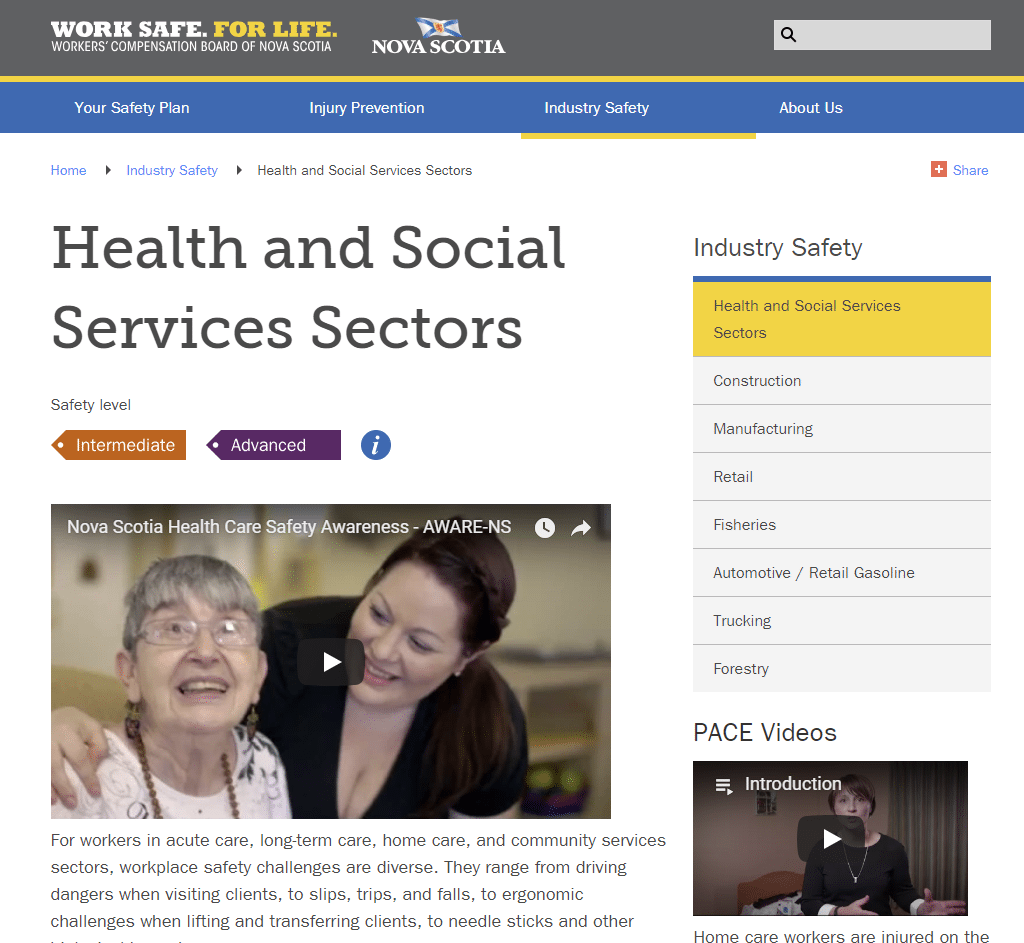
This section covers the procedures and measures used for flagging the risk of violent behaviour of patients and persons of interest.

Violence risk screening – 10 (V-RISK-10): Assessment Form
The assessment form to be used by those wishing to screen patients using the V-Risk-10 system.
The home site for the Broset violence assessment and features the 6-item checklist and academic research supporting it.
Point of Care Assessment Tools: Agitation & Aggression
Video: Agitation & Aggression
Safe-handling guide for agitated or aggressive behaviour. The Workers’ Compensation Board of Nova Scotia has adopted a model for handling home care clients, which includes assessing patients for agitation and aggression.
Flagging Patient Records: Report on a Method of Communicating Risk, May 2017
NSHRF was contracted by the Nova Scotia Department of Health and Wellness to provide synthesis on the topic of balancing worker safety and patient / client / resident confidentiality with respect to communicating risk posed by patients to staff.
Individual Client Risk Assessment Toolkit for Health Care Settings
The ICRA toolkit has been developed to help identify behaviours and triggers associated with increased risk of violence so prevention measures for staff and the client may be taken. The toolkit contains:
1. A Violence Assessment Tool – includes risk indicators, a risk rating scale and a list of potential triggers
2. A list of suggested control interventions
3. A sample policy
Individual Client Risk Assessment
This toolkit addresses individual client risk assessment and has been developed to help identify behaviours and triggers associated with increased risk of violence so prevention measures for staff and the client may be taken.
Communicating the Risk of Violence: A Flagging Program Handbook for Maximizing Preventative Care
This flagging handbook provides practical tools and information that will help organizations develop a sustainable flagging-alert program that focuses on providing quality preventative care.
Workplace Violence Prevention – Flagging Process for Patients Exhibiting Acting-out Behaviour
The purpose of this procedure is to have a visible warning system for all staff, physicians and volunteers, for patients who have or who have the potential to act violently.
Integrated Care Pathway: Dementia – Agitation and Aggression. Leading Practices in Mental Health
In the past three years CAMH has successfully setup an Integrated Care Pathway (ICP) program and developed and implemented seven ICPs for specific conditions and patient groups, including the first related to the diagnosis of ‘Dementia – Agitation and Aggression’.
Violence Screening Tool: Client Screening Form, Policy and Reference Guide
The patient assessment system currently in use at the Prairie Mountain Health regional authority.
Behaviour Documentation Toolkit
A guide from the Violence Prevention Advisory Group, which overviews three different examples of behaviour documentation tools.
Short-Term Assessment of Risk and Treatability: Leading Practices in Mental Health, 2011
The Short-Term Assessment of Risk and Treatability at the BC Mental Health and Addiction Services (BCMHAS) is a 20-item clinical guide for the dynamic assessment of seven risk domains (violence to others, suicide, self-harm, self-neglect, unauthorized absence, substance abuse and victimization).
Point of Care Assessment Procedure
The Point of Care Assessment was created to help you continually assess risk, which includes a series of questions to ask yourself about the patient, the environment, the task and yourself.
Notifications